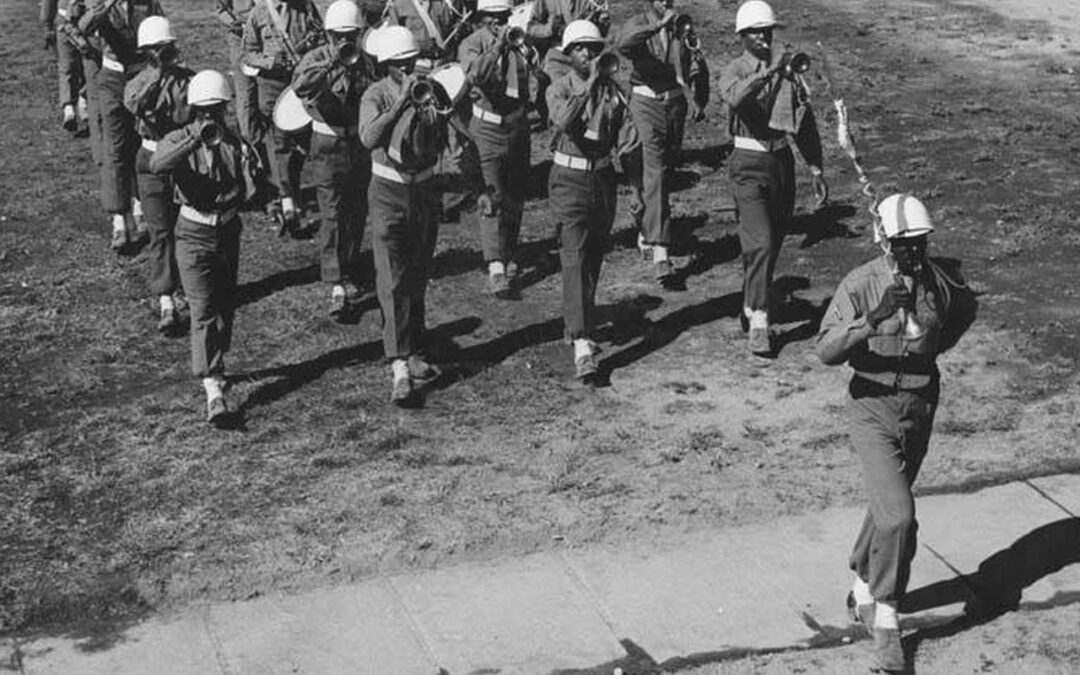Buffalo Soldiers Signal Corp. photo courtesy of the Buffalo Soldiers Museum
BY M.V. SMITH
African-American communities have always looked inward to preserve their history, knowing that it may be ignored by mainstream institutions. Among countless examples, scrapbooks created by Philadelphia’s William Henry Dorsey, filled with ephemera like newspaper clippings and church programs, form an invaluable resource detailing the daily rhythms of Black life in the 19th century. More recently, in 2021 Maya Cade created the Black Film Archive, a clearinghouse for historic Black cinema, singlehandedly writing thumbnail descriptions and tracking down streaming links for hundreds of movies. Closer to home is Tacoma’s 9th and 10th Cavalry Buffalo Soldiers Museum, the passion project of the late businessman William Jones, an African-American Korean War POW who served in the U.S. Army for twenty years.
Raised in 1866, the six regiments comprising the Buffalo Soldiers were the first all-Black units in the peacetime Army. Nicknamed, according to legend, by indigenous Plains tribes who equated their thick, curly hair and fierceness in battle to the buffalo, Buffalo Soldiers provided all-purpose manpower, building much of the infrastructure, from roads to forts, that fueled America’s western expansion. In Washington state, Buffalo Soldiers participated in the 1904 American Lake Maneuvers, training exercises that eventually led to the establishment of Fort Lewis (now Joint Base Lewis-McChord) outside Tacoma, and were stationed at Fort Lawton, in what is now Seattle’s Discovery Park.
Born in 1919 to Arkansas sharecroppers, Jones was among the last men to serve in those regiments before the Army’s 1948 desegregation, joining the 10th Cavalry in 1942. Relegated to support roles during the Second World War, he eventually saw combat in Korea. Captured in late 1950 by Communist forces, he endured nearly three years of brutal imprisonment. Released in 1953, he spent the remainder of his Army career at Fort Lewis, eventually earning the rank of master sergeant. Following his 1961 retirement, he stayed in Tacoma, founding Jones Glass and Recyclables, an architectural salvage company. His daughter Jackie Jones-Hook, now executive director of the Buffalo Soldiers Museum, remembers her father as “one of the most creative men that I know,” a staunch Republican entrepreneur who, in addition to Jones Glass, bought and renovated rental properties.
Like many veterans, Jones only reluctantly discussed his wartime record with his family. Toward the end of his life, however, he embraced his past, befriending other former Buffalo Soldiers, collecting Buffalo Soldiers memorabilia, and speaking to community organizations about his experiences. Inspired by a similar museum in Houston, Jones founded the Buffalo Soldiers Museum in 2005. He purchased a building next door to Jones Glass as a home for his collection, offering tours on an informal basis. “If anybody wanted to see, he would just bring them through,” Jones-Hook recalls. Shortly before his 2009 death, Jones asked his daughter to take over the museum. Recently retired from a career in Washington state government, Jones found that her bureaucratic skills transferred well to her new task. “With my background in public administration and business administration, it was sort of a natural segue for me to pull people together,” she says.
Over time, Jones-Hook built a formal structure for her father’s labor of love, recruiting a board of directors and securing 501(c)(3) non-profit status, and opening the museum to the general public in 2012. She worked to expand the museum’s youth education offerings, receiving a 2019 grant from the Institute of Museum and Library Services to fund SEED (Summer Excitement, Exploring, and Discovery), a week-long tour of historic sites in Washington state associated with Black servicemen. She additionally spearheaded efforts to preserve historic sites associated with the Buffalo Soldiers, collaborating with Historic Seattle, the Washington Trust for Historic Preservation, and other partners on a proposal to move the museum to Fort Lawton’s long-vacant 25th Infantry band building, a segregation-era barracks for Black servicemen.
First stationed at Fort Lawton in 1909, musicians from the 25th Infantry performed at Seattle parades until the 1950s, joined in the 1940s by the Washington National Guard’s 41st Infantry Division Band, whose members included Quincy Jones and Robert “Bumps” Blackwell. Seizing on the military connection to local music history, in 2021 Jones-Hook organized the “History, Legends, and Legacy” winter concert series at the Seattle Center Armory to promote her expansion plans, strategically choosing a season – bookended by Veterans Day in November and Black History Month in February – when the public’s attention to her cause would be at its height. Seeking booking advice, she approached Jim Foster, in her opinion “one of the greatest jazz enthusiasts I know.” Foster produced Jazz Live at Marine View, which ran for 115 performances in the sanctuary of Tacoma’s Marine View Presbyterian Church, where he met Jones-Hook, an avid attendee. Foster was happy to help his friend. “With the contacts that I have in the music industry, it was a natural fit,” he said. Following Foster’s recommendations, the series has hosted many of the Seattle region’s top jazz acts, from Greta Matassa and Michael Powers to Gail Pettis and Duende Libre. The series combines the power of jazz storytelling with an educational exhibit provided by the museum at the Armory. Rounding out the 2022-23 series with performances on February 5 and 19 are FADE Jazz Quintet and Elnah Jordan Experience. These events are free and open to the public, from noon to 2pm.
With expansion plans still in development, the museum remains largely a one-woman operation; during her Earshot Jazz interview, Jones-Hook simultaneously led visitors on a tour and arranged the donation of a World War II-era M1 Carbine by a firearms collector. Jones-Hook takes her struggles in stride: “I think the most value in life is really in giving back.” She contrasts the “unselfish act(s)” of the Buffalo Soldiers, who “wanted America to see that they could be good citizens and that they could do their jobs with dignity and integrity,” with the current day, marked by what she considers a self-centered ethos. “Most people come to this country for capitalism. They want to be the next Bill Gates…you know, it’s all about them,” she says. “Not everybody’s gonna be a millionaire. But people who serve in the military, they still believe in America. They still believe in service to country.”





